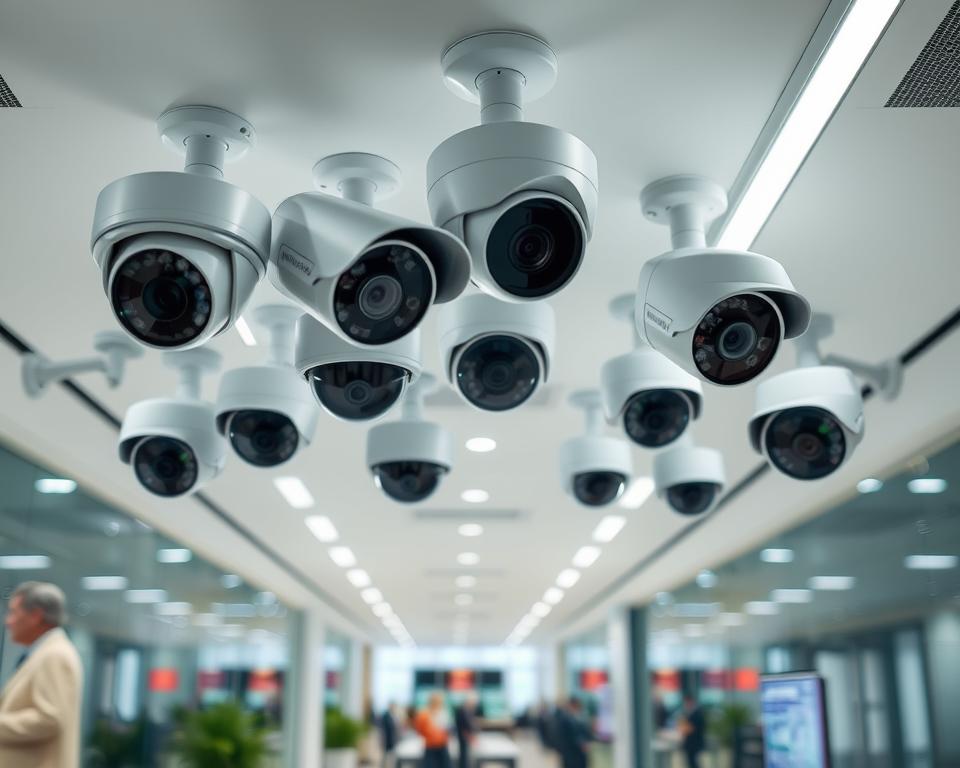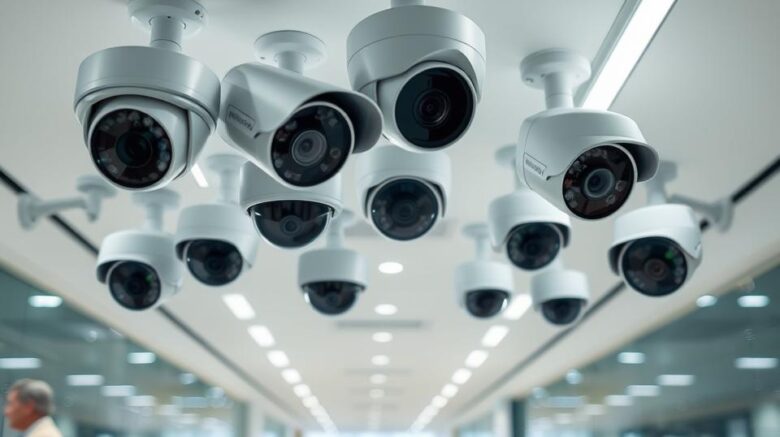Maximizing Safety with Hospital Security Guards
Did you realize that medical centers experience roughly 30 violent episodes each day? This alarming figure highlights the essential role of Hospital Security Guards. They secure patients, employees, and sensitive information. In the rapidly evolving health sector, strong Healthcare Facility Security is paramount. It focuses on forming safe zones where patients obtain services without threats of violence or information breaches.
Collaborating with established experts such as Divine Protection Services strengthens Medical Center Security Services. This guarantees that security remains foremost while maintaining accessibility. This write-up delves into how vehicle patrol security guards strategies and monitoring setups can substantially bolster security efforts. It addresses both inside and outside dangers efficiently.

Salient Features
- Hospital Security Guards play a vital role in protecting patients, staff, and sensitive data.
- Healthcare Facility Security is vital to reduce violent episodes and protect privacy.
- Combined security systems boost the complete efficiency of hospital safety operations.
- Collaboration with firms like Divine Protection Services ensures tailored security solutions.
- State-of-the-art technologies are the foundation of present-day healthcare security solutions.
- Balancing accessibility and privacy is critical for effective hospital security measures.
Why Hospital Security Matters
Hospital security is vital for protecting patients, employees, and private information. The rise in violence in medical settings highlights the need for strong Hospital Security Guards. Such guards are crucial for sustaining a protected atmosphere and preserving the rights and dignity of all.
Enforcing robust Healthcare Facility Security plans is fundamental to stop violent behavior. This assists in fostering a caring atmosphere, enhancing the experience for patients and families. It additionally secures conformity with rules such as HIPAA, enforcing secure access to safeguard Protected Health Information (PHI). These actions not only defend patients but also nurture trust between healthcare teams and their communities.
| Type of Security Measure | Significance | Compliance with Regulations |
|---|---|---|
| Access Control Systems | Limit unapproved entry and permissions | Essential for HIPAA compliance |
| Surveillance Cameras | Oversee actions and discourage wrongdoing | Aligns with rules for secure environments |
| Emergency Response Plans | Enable swift reaction to emergencies | Compliant with safety and emergency management guidelines |
| Training for Security Personnel | Prepare personnel with crisis management abilities | Meets required safety and security norms |
Committing to comprehensive security solutions and staff training is indispensable for protecting hospitals and health centers. These procedures create a secure and regulation-adherent space, crucial for providing excellent patient care.
Duties of Hospital Security Guards
Hospital security guards play a vital role in keeping healthcare facilities safe. They supervise entry areas to prevent unauthorized access, address emergencies, and utilize conflict de-escalation to avoid threats. With training from Divine Protection Services, they can spot and manage signs of agitation or violence.
Their presence is fundamental to maintaining the health and security of patients and staff. They secure the hospital’s processes, critical for a healing setting. By providing protection, they boost patient satisfaction and decrease threats.
Cutting-Edge Technologies for Hospital Security
Contemporary hospitals are turning to Advanced Technologies to strengthen their protection systems. Medical Center Security Services seamlessly merge AI-based surveillance cameras to improve observation capabilities. These cameras offer real-time tracking and analysis, enabling staff to identify and respond to threats swiftly.
One of the key aspects of Healthcare Security Solutions is the use of access control systems. These systems restrict entry to sensitive areas, ensuring that only authorized personnel can access critical zones. Through biometric authentication, healthcare facilities can introduce an additional security tier for patient records and critical medical devices.
Artificial intelligence security applications are pivotal for physical safeguarding. Facial recognition and behavior detection enable security personnel to respond promptly to security breaches. Enhanced video analytics underpin strategic decisions, ensuring uninterrupted surveillance of medical facilities. This cultivates a secure space for personnel and patients.
| Innovation | Application | Benefits |
|---|---|---|
| AI-driven Surveillance | Live tracking | Immediate threat identification |
| Access Control Systems | Controlled access | Guarding important sections |
| Facial Recognition | Biometric verification | Stopping unapproved entry |
| Video Analytics | Operational oversight | Insight-based strategies |
New Technologies safeguard hospital property and help establish a secure setting for everyone. By investing in these cutting-edge tools, healthcare facilities can remain vigilant against security threats. This guarantees top-tier patient care.
Healthcare Facility Security Strategies
Effective Healthcare Facility Security strategies are essential for safeguarding patients, staff, and visitors in medical centers. Executing detailed risk analyses is the basis of these approaches. By detecting flaws, healthcare institutions can formulate specialized plans for various cases. This elevates their preparedness for any possible incidents.
It’s important to foster the reporting of abnormal behaviors and threats. Hospitals should maintain processes to address such notifications promptly. This proactive stance in Healthcare Facility Security creates a culture where everyone contributes to safety.
Visitor management is a critical aspect of Medical Center Security Services. Confirming that only sanctioned people enter maintains a secure atmosphere. Watching over patient-caregiver interactions helps diminish risks. This secures the area for all. Below is a table outlining key components of effective security strategies.
| Security Element | Overview | Outcomes |
|---|---|---|
| Risk Assessments | Identifying vulnerabilities and assessing possible threats. | Increases readiness and reaction effectiveness. |
| Incident Reporting | Prompting stakeholders to report odd conduct. | Promotes prompt action against risks and raises alertness. |
| Visitor Management | Standards for tracking and managing facility entry. | Strengthens safety and diminishes illicit access. |
| Staff Training | Ensuring staff receive comprehensive security training. | Empowers staff to handle security incidents effectively. |
Training Security Personnel Effectively
Effective training for healthcare security personnel is key to maintaining safety in hospitals. Regular instruction assists personnel in coping with evolving risks. It additionally improves their skill in handling diverse incidents.
Divine Protection Services focuses on cultivating robust situational awareness among security teams. This encompasses mastering conflict resolution techniques for tense interactions. Consistent practice drills and role-play exercises reinforce policies. Employees develop skills to tackle threats promptly while safeguarding dignity and respect.
This style of coaching security personnel surpasses simple defensive measures. It fosters a culture of safety and professionalism in healthcare facilities. By emphasizing essential skills, medical centers guarantee their security staff can face threats competently.
Meeting Compliance Requirements
Adhering to Regulatory Standards is critical for medical centers striving for safety and credibility. HIPAA, for instance, requires secure access controls to protect Patient Health Information (PHI). These protocols prevent unauthorized access and breaches of sensitive data.
Healthcare providers can boost their compliance by adopting detailed policies. They involve recurring reviews, personnel instruction, and transparent incident notification procedures. These steps not only ensure patient well-being but also foster community confidence.
Organizations like Divine Protection Services provide tailored compliance solutions for medical centers. Their expertise in Hospital Security Services ensures that security teams are well-trained to meet regulatory standards.
Commitment to compliance reduces risks and builds a strong patient-provider relationship. A proactive view on regulations aids the entire healthcare infrastructure.
Hospital Security Guards in Action
Hospital Security Personnel play an essential role in preserving medical facility safety. Their efforts appear in numerous practical scenarios, showcasing their anticipatory methods. As an example, they handle disagreements in lobbies, rapidly defusing them to forestall violence.
In high-pressure instances, these officers guide individuals to protective zones, assisting them as required. This measure shields those at risk and preserves a peaceful setting. Their partnership with law enforcement during emergencies highlights the significance of Professional Healthcare Security. They often serve as the first line of response.
Education provided by Divine Protection Services trains these guards to respond to emergencies adeptly. They acquire skills to uphold policies while maintaining respect for all. This mix of command and empathy positions them as essential parts of the healthcare team. They commit to ensuring security and protection for everyone on site.
Adapting Security Solutions for Hospitals
Healthcare institutions confront distinct security hurdles that necessitate a personalized approach. Customizing Security Solutions is key to effectively tackling these issues, ensuring a safe space for both patients and staff. Collaborating with specialists such as Divine Protection Services allows hospitals to develop security plans tailored to their exact requirements.
A holistic security strategy encompasses vital domains like violence avoidance and pharmacy protection. By using advanced technologies, facilities can boost their safety measures while adhering to HIPAA standards. This often includes visitor management systems and flexible access control solutions that adapt to the facility’s evolving needs.
The role of Medical Facility Guards is also vital. They undergo dedicated training to address security events and remain continually alert. Their presence fends off risks and comforts both staff and patients.
The table below shows how Customizing Security Solutions addresses various healthcare challenges:
| Issue | Custom Solution |
|---|---|
| Violence Prevention | Educating Medical Facility Guards in conflict de-escalation methods |
| Medication Security | Implementing locked pharmaceutical storage and tracking mechanisms |
| Visitor Management | High-level visitor vetting and credential issuance procedures |
| Access Control | Flexible access control platforms that adapt to operational demands |
By strategic preparation and teaming up with the appropriate entities, hospitals can create a robust security framework. This is achieved through Customizing Security Solutions to their unique requirements. Uniting careful human monitoring with tech solutions substantially bolsters security, creating a safer, more effective healthcare space.
To Conclude
Securing the safety and health of patients, personnel, and confidential data is critical in hospitals. Hospital Security Guards currently leverage state-of-the-art technology and education to address modern dangers. This advancement not only shields physical premises but also strengthens trust between patients and healthcare professionals.
Customized Healthcare Security Solutions help hospitals stay ahead in the ever-changing security landscape. Partnering with experienced firms like Divine Protection Services equips healthcare facilities to handle safety concerns effectively. By integrating workforce training with advanced tech, hospitals can develop a safe environment for medical treatment and care.
The health sector grapples with escalating risks, making professional security steps vital. Hospitals must adopt these evolving solutions to safeguard their environments and uphold the dignity of their operations.
